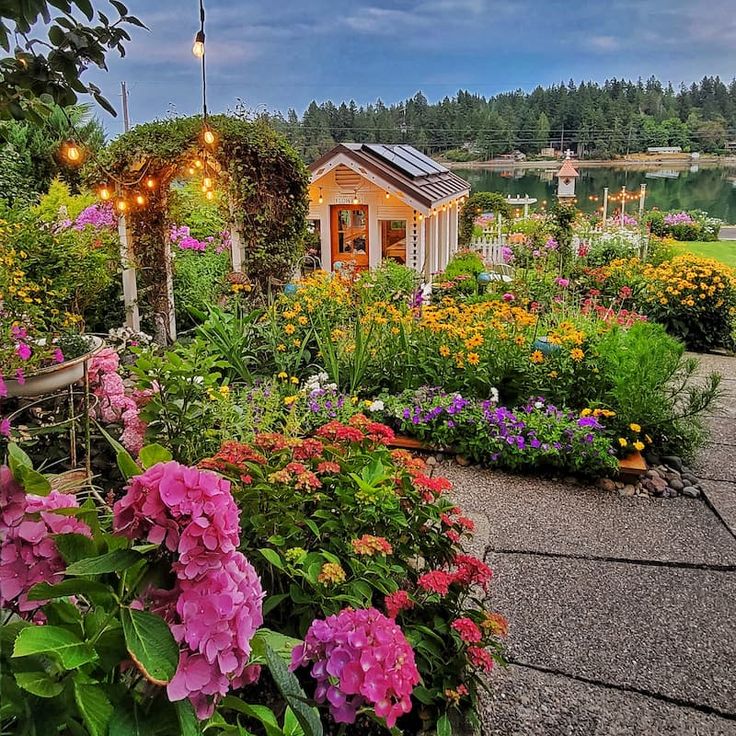The Importance of Regular Maintenance: Tips for Caring for Your Back Garden All Year Round

The back garden, as a container or private place that provides peace and natural beauty in your yard, describes a space that is a place amidst the noise of the outside world. Through consistent and proper maintenance, keeping your garden lush, green and charming throughout the year becomes an obligation that cannot be ignored. By implementing a series of appropriate care tips, you can ensure that your garden is not only a pleasant place to relax, but also a private paradise that allows you to enjoy the irreplaceable beauty of nature, breathe in the fresh air while feeling the calming presence of nature in every corner and details.
Spring

Spring is an important time to start preparing your backyard after winter. As nature begins to revive, it's a great time to begin the steps necessary to refresh and renew your garden. Here are some steps you can take:
1. Cleaning and Trimming
Start by clearing your garden of dry leaves, twigs, and other debris that has accumulated over the winter. Prune plants that need care to stimulate new growth. In addition, pruning plants that require maintenance is also an integral part of this process. This pruning not only helps in improving the appearance of the plant, but also stimulates new growth and ensures that the size and shape of the plant match your wishes.
2. Replanting
Spring is the ideal time to replant dead plants or replace plants that are not growing well. Choose plants that suit the climate and soil conditions in your area.
3. Fertilization
Apply organic fertilizer to provide the nutrients your plants need to grow well. Fertilization can help improve plant health and improve soil quality.
4. Pest and Disease Control
Check your garden for signs of pest infestation or disease. If found, immediately take the necessary control measures to prevent its spread to other plants.
Summer

Summer brings new challenges in caring for a garden, especially with rising temperatures and drought. Significantly rising temperatures and lack of rainfall can result in environmental conditions that are inhospitable to plants, putting your garden at risk of drought and heat stress that can affect its growth and health. Here are some tips for caring for your garden during the summer:
1. Regular Watering
Make sure to water the garden regularly, especially during hot, dry periods. Water enough to keep the soil moist, but avoid overwatering which can cause water accumulation and trigger problems such as fungal diseases.
2. Weed Control
Perform regular weed control to prevent them from spreading and competing with desirable plants for nutrients and water.
3. Advanced Pruning
Perform further pruning on plants that require additional care during the summer. This can help maintain the shape of the plant and promote healthy growth.
4. Protection from Overheating
If temperatures are particularly high, consider providing additional shelter for plants that are susceptible to overheating.
Fall

Fall is the time to enjoy the colors of fall and prepare your garden for winter. Amidst the stunning changing colors of the leaves and the crisp air, it's the ideal time to make final preparations before winter arrives. Here are some tips for caring for your garden during the fall:
1. Final Pruning
Do any final pruning on plants that need care before winter arrives. These include plants that thrive during the summer and need to be prepared for a period of dormancy.
2. Preparation of Plants for Winter
Provide an additional layer of mulch or covering material around the plant to help retain soil moisture and protect the roots from extreme freezing temperatures.
3. Harvest Garden Products
Harvest your garden before winter arrives. This includes fruits, vegetables, and herbs that are ripe and ready to be harvested.
4. Maintenance of Garden Tools and Equipment
Check and clean your garden tools and equipment before storing them for the winter. Make sure they are in good condition for reuse next spring.
Winter

Winter is a downtime for your garden, but there are still some measures you need to take to ensure your garden's health in winter. Although plant growth activities may slow or even stop, maintenance measures are still needed to anticipate potential damage due to low temperatures and extreme weather:
1. Protection of Cold Sensitive Plants
Provide additional protection for plants susceptible to freezing temperatures and extreme cold weather. This could be additional shade or garden cover.
2. Snow Management
Clear snow that has accumulated on plants or garden structures to prevent damage from excessive snow load.
3. Plant Monitoring
Monitor your plants regularly during the winter to ensure that they remain healthy and do not suffer cold damage.
4. Planning for Next Spring
Use the winter time to plan garden projects for next spring, including new plantings, infrastructure improvements, and routine maintenance.
Rainy season

id.pinterest.com
The tropical monsoon brings high humidity and heavy rainfall. High humidity can trigger rapid weed growth and cause root-rotting plant diseases. Heavy rainfall can cause waterlogging that damages plants and creates an ideal environment for insects and disease. Here are some tips for caring for your garden during the rainy season:
1. Good Drainage
Make sure your garden has a good drainage system to prevent standing water which can damage plants and roots.
2. Monitoring Soil Wetness
Regularly monitor soil wetness levels to ensure that overwatering does not occur which can cause root rot.
3. Maintenance of Park Structures
Inspect and repair garden structures such as ponds, embankments, and waterways to ensure they are in good condition and able to handle heavy rainfall.
4. Additional Fertilization
In some cases, high rainfall can drain nutrients from the soil, so it is necessary to provide additional fertilization to maintain the balance of soil nutrients.
By paying attention to and diligently following these care tips throughout the year, you can ensure that your backyard always exudes alluring beauty and health. By adding a few touches of routine maintenance and extra attention, you can create an incredibly stunning environment that your entire family can enjoy. During this process, you will find yourself immersed in the boundless riches of tropical nature, enjoying nature's extraordinary abundance.







